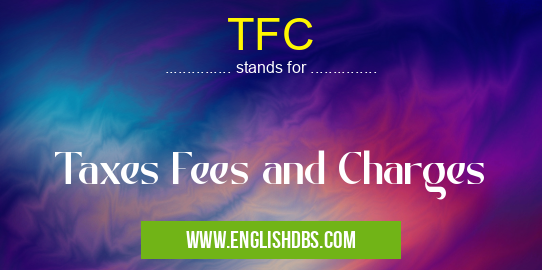What does TFC mean in TAX
Taxes, Fees, and Charges (TFC) represent a collective term used in the business and financial context to describe a range of mandatory payments imposed by governments or other regulatory bodies. These payments are typically associated with the provision of goods or services, or the exercise of specific rights or privileges. Understanding the concept of TFC is crucial for businesses and individuals alike, as it directly impacts financial planning and decision-making.

TFC meaning in Tax in Business
TFC mostly used in an acronym Tax in Category Business that means Taxes Fees and Charges
Shorthand: TFC,
Full Form: Taxes Fees and Charges
For more information of "Taxes Fees and Charges", see the section below.
Meaning of TFC
-
Taxes: These mandatory payments are levied by governments to generate revenue for essential public services, such as healthcare, education, and infrastructure. Taxes can take various forms, including income tax, sales tax, and property tax.
-
Fees: Fees are charges imposed by government agencies or private entities for the provision of specific goods or services. Unlike taxes, fees are typically linked to the cost of providing the service or benefit, such as passport fees, driver's license fees, and toll charges.
-
Charges: Charges are similar to fees, but they are generally broader in scope and may cover a wider range of services or activities. Charges are often imposed to recoup the costs of specific projects or programs, such as environmental protection charges or hospital surcharges.
Essential Questions and Answers on Taxes Fees and Charges in "BUSINESS»TAX"
What are Taxes, Fees, and Charges (TFCs)?
TFCs are various financial levies imposed by government entities or service providers on goods, services, or transactions. They generally fall into three categories:
- Taxes: Mandatory contributions to the government, primarily used to fund public services like healthcare, education, and infrastructure.
- Fees: Charges for specific services or activities provided by the government or other authorized entities, such as driver's license fees or parking charges.
- Charges: Levies imposed to cover the costs of a specific service or facility, such as tolls for road maintenance or fees for garbage collection.
How do TFCs differ from each other?
The primary distinction between taxes, fees, and charges lies in their purpose and legal basis. Taxes are non-refundable and imposed to raise revenue for general government purposes, while fees generally cover the specific cost of a service or activity. Charges, on the other hand, are typically levied to recover the expenses of maintaining or operating a particular facility or service.
How are TFCs determined and regulated?
TFCs are typically established by relevant government agencies, such as tax authorities or regulatory bodies. They may be based on various factors, including the cost of providing the service, the need for revenue generation, and policy considerations. Regulations and oversight mechanisms are in place to ensure transparency, fairness, and compliance with established rules.
What is the impact of TFCs on consumers and businesses?
TFCs can affect consumers and businesses in several ways. They may increase the cost of goods and services, influence consumer behavior, or impact business operations. However, TFCs can also contribute to the funding of essential public services and infrastructure that benefit society as a whole. Striking a balance between revenue generation and minimizing the burden on individuals and businesses is a key consideration in TFC policymaking.
Are there any exemptions or reductions for TFCs?
In some cases, exemptions or reductions may be available for certain individuals, groups, or situations. For example, low-income households may qualify for tax breaks or fee waivers. It is important to consult with relevant authorities or seek professional advice to determine eligibility for any applicable exemptions or reductions.
Final Words: TFC plays a significant role in the financial landscape, impacting both businesses and individuals. Understanding the different components of TFC is essential for making informed decisions, allocating financial resources effectively, and ensuring compliance with regulatory requirements. By considering TFC in business planning and personal budgeting, individuals and organizations can optimize their financial well-being and contribute to the overall economic ecosystem.
TFC also stands for: |
|
| All stands for TFC |
